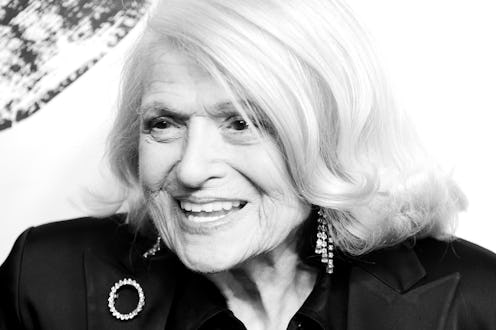News
Edith Windsor, The Woman Who Led The Fight For Marriage Equality, Has Died At 88

According to a report in The New York Times, the legendary gay rights activist Edith Windsor passed away in Manhattan on Tuesday. Windsor was known for her same-sex marriage advocacy, an icon for equality and progressive values as she gained nationwide attention for her groundbreaking Supreme Court case against the Defense of Marriage Act in 2013. At this moment, the cause behind Windsor's death has not been made public so far.
The 88-year-old icon is survived by her wife, Judith Kasen-Windsor, whom she married in 2016. Windsor's rise to gaining public status as a figure in demanding equal rights for same-sex marriages started on a simple and rather mundane note: taxes. According to an in-depth profile published in The New Yorker magazine, Windsor's journey to becoming a plaintiff in the landmark and stunning Supreme Court case began with an issue she reportedly found in her estate taxes.
Four years before the 2013 case, Windsor's former spouse, Thea Spyer, had passed away and left her assets to Windsor. Spyer and Windsor had married in Canada in 2007 but their marriage was not recognized in the United States of America due to the Defense of Marriage Act. Under the Defense of Marriage Act, Windsor could not apply for tax exemption, something that married heterosexual couples are entitled to. She was reportedly expected to pay a heavy amount of money (a reported $350,000 collectively) in taxes to both the federal government as well as the New York State.
Windsor's case for demanding that the federal government recognize her marriage to her former spouse ultimately surfaced in the Supreme Court. The Supreme Court ruled in a 5-4 decision that one particular stipulation within the 1996 Defense of Marriage Act was "unconstitutional." It was referring to the Section 3 of the act which limited the legal definition of "spouse" to married heterosexual couples only.
The revolutionary decision was announced by Justice Anthony Kennedy who supported the decision. "The federal statute is invalid, for no legitimate purpose overcomes the purpose and effect to disparage and to injure those whom the State, by its marriage laws, sought to protect in personhood and dignity," Kennedy said. He went on to say, "By seeking to displace this protection and treating those persons as living in marriages less respected than others, the federal statute is in violation of the Fifth Amendment."
Windsor spent the later years of her life committed to fighting against bigotry toward the LGBTQ society. On the surface, it may seem as if Windsor simply sought a tax refund but her fight went far beyond that. Her case for demanding federal recognition of same-sex marriages fueled more momentum into LGBTQ movements that highlighted how federal benefits were denied to same-sex couples under the Defense of Marriage Act. In other words, Windsor's struggle was about LGBTQ couples' lack of access to social security and stability.
The icon herself was surprised at how significant her struggle became in the political context of the United States of America. In 2013, Windsor spoke with BuzzFeed and shared her personal thoughts on her case that became a rallying cry for gay and lesbian couples in the country. The activist expressed joy at the amount of support she had received and shared refreshing optimism for the future in the interview.
"The idea that I might be a piece of history blows my mind," Windsor said, "I think it's kind of wonderful that I'm getting my chance to really ask for justice, and I suspect I'll get it. I'm still that little kid from the civics class. And I think they're going to rule in our favor because I think that's just."